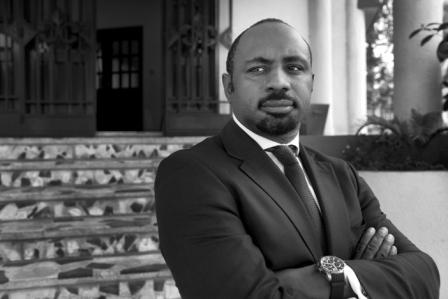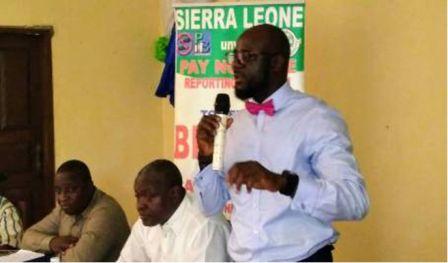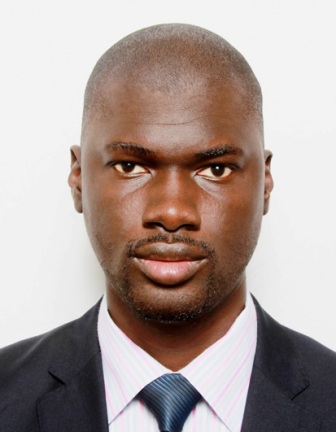Sierra Leone needs to see some leadership from the middle!
Our preoccupation with the people at the top of organisations prevents us from recognising the critical role played by those unsung toilers in the middle – our middle managers. (Photo: John Sisay, CEO Sierra Rutile)
Upper management creates strategy, but it falls to middle management to implement it. They are our organisational engines. Their job is to recruit, train, motivate, organise and supervise the workforce day in and day out. In an economy such as ours, with a largely unskilled and untrained labour pool, it is a relentless but essential task if Sierra Leonean companies are to fulfil their potential.
In many ways filling middle management vacancies is harder than recruiting for upper management positions. Like it or not, the market for CEOs is a global one, especially for big international businesses. Sierra Leone is not alone in that phenomenon. We only need look across the Atlantic where USA current affairs magazine Slate recently asked: “Why are big American companies hiring foreign-born CEOs?”
Our pool of middle managers, on the other hand, ideally needs to be developed nationally. We need people who are hard-wired to the country’s cultural pulse, who understand and respect our deep-rooted social and cultural traditions sufficiently to know when and how to challenge them. We also need people who are able to communicate, track and accomplish corporate goals, be role models, interpret management policy and bring it to life for their staff.
These multi-skilled, multi-tasking middle management paragons also need to be up for the challenge of transforming Sierra Leone’s organisations from within.
Let us be honest, Sierra Leone’s organisational culture is more often than not inimical to progress. We rarely fire people, incompetence notwithstanding; customer service remains a foreign concept; jobs are awarded on the basis of personal relationships and patronage; organisational pride, self-motivation, responsibility and going that extra mile for the company – eight times out of ten – forget it. Too many of our organisations are deeply frustrating places to work in or work with.
Middle managers are in the perfect position to be our much-needed agents of change. In a column for Fast Company titled “Leadership starts in the middle, not at the top,” Roberta Matuson, HR consultant and author, writes: “Strong leadership in the middle will produce outstanding operational results, easing the need for top managers to oversee and intervene in day-to-day operations.”
Like all major business model changes, it is a strategy that requires both parties to be willing to take risks. Sierra Leone’s companies have traditionally placed middle managers in the catch-22 of responsibility without power. If they are to become catalysts for change, those at the top will have to loosen the reins, and those in the middle will have to step up and seize the opportunity.
At Sierra Rutile, improving the capabilities of our middle managers is a corporate focus. Our management development is a work in progress, but we have a policy of promoting skilled and motivated people from within and giving them the space, time, training, and crucially the autonomy, to become the organisation’s power house.
We have put training at the centre of the process and are presently improving the management, operational and technical skills of almost 100 managers through in-house courses, distance learning or university attendance. Where we do employ from abroad, we ensure that we have a Sierra Leonean national working alongside to learn the job. It’s no coincidence that last year Sierra Rutile was the first Sierra Leonean based company to win the AIM International Company of the Year Award.
As a nation, we have known for some time that our workplace culture is well past its sell-by date. We complain about it, yet we baulk at the steps we need to take to create change.
Management expert Peter Drucker could well have been talking about Sierra Leone when he said: “Everybody has accepted by now that change is unavoidable. But that still implies that change is like death and taxes it should be postponed as long as possible and no change would be vastly preferable. But in a period of upheaval, such as the one we are living in, change is the norm.”
If Drucker had been writing about Sierra Leone, he could have added voting to the list of things we postpone or avoid. In November’s election, how many of those who consider themselves to be informed and responsible middle-class individuals, did not vote, and often for the most derisory reasons: it was hot, we were busy, the queue was too long, or the dye used at the polling stations was indelible.
Harvard Business School professor John Kotter argues that “leaders must understand that leadership is not just the job of the person above them in the hierarchy.” In today’s Sierra Leone, it’s time that leadership came from the middle – whether it involves paying taxes, voting or transforming our organisations into dynamic and successful 21st century institutions.
By John Sisay, CEO Sierra Rutile
Stay with Sierra Express Media, for your trusted place in news!
© 2013, https:. All rights reserved.







Greg Chponda
/
This is so true, Africa’s problems is not only its leaders, but the foot soliders in the form of civil servants are corript. Lets not put trust in individuals per se butlets put in place institutions that safe guard our democracies, we need checks and balances for power corrupts
16th March 2013